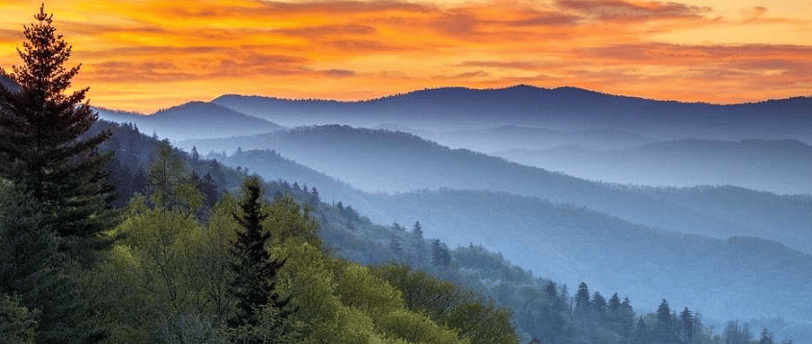Seeing the Great Smoky Mountains National Park Without Breaking the Bank
Discover how to explore the Great Smoky Mountains National Park on a budget with our comprehensive guide. Learn about affordable lodging options, including budget hotels, vacation rentals, and hostels. Find out how to save money by camping, with tips on frontcountry, backcountry, and dispersed camping. Take advantage of government discount cards like the America the Beautiful Pass and Senior Pass to reduce costs. Enjoy free activities such as hiking on popular trails like Alum Cave and Clingmans Dome. Get tips on fishing with necessary licenses and best spots, and explore boating and kayaking opportunities at Fontana Lake and Douglas Lake. Plan your budget-friendly adventure to the Great Smoky Mountains today
LATEST POSTS
Harve Pettigrew
7/4/20243 min read


The Great Smoky Mountains National Park is a treasure trove of natural beauty, offering a diverse range of activities for outdoor enthusiasts. Whether you're a seasoned hiker, an avid camper, or just someone looking to escape into nature, this guide will help you explore the park without breaking the bank.
Lodging on a Budget
When it comes to lodging, there are several affordable options to consider:
Budget Hotels and Motels: Look for budget-friendly hotels in nearby towns like Gatlinburg and Pigeon Forge. Websites like Booking.com and Expedia often have great deals, especially during the off-season.
Vacation Rentals: Platforms like Airbnb and Vrbo can offer cost-effective alternatives, especially if you're traveling with a group. Sharing a vacation rental can significantly reduce your per-person cost.
Hostels: There are a few hostels in the area that offer affordable accommodations with the added benefit of meeting fellow travelers.
Camping: Embrace the Outdoors
Camping is one of the best ways to experience the Great Smoky Mountains and it's also budget-friendly:
Front country Camping: The park has several developed campgrounds with amenities like restrooms and running water. Sites typically cost between $17-$25 per night. Popular campgrounds include Cades Cove and Elkmont.
Backcountry Camping: For a more immersive experience, backcountry camping is an excellent option. It's free, but you need a permit, which costs $4 per person per night.
Dispersed Camping: For the adventurous, dispersed camping is allowed in the surrounding national forests. This type of camping is more rugged and doesn't provide amenities, but it's free.
Government Discount Cards
If you're eligible, take advantage of government discount cards:
America the Beautiful Pass: This annual pass costs $80 and covers entrance fees for all national parks and federal recreational lands. It's a great investment if you plan to visit multiple parks.
Senior Pass: For U.S. citizens aged 62 and older, the Senior Pass costs $20 annually or $80 for a lifetime pass. This pass provides free entrance to national parks and discounts on some amenities.
Access Pass: This is a free, lifetime pass available to U.S. citizens or permanent residents with permanent disabilities. It offers the same benefits as the Senior Pass.
Hiking: Explore the Trails
Hiking is one of the most popular activities in the Great Smoky Mountains, and it's free! Here are some must-try trails:
Alum Cave Trail: A moderate 4.4-mile round-trip hike offering stunning views and interesting geological formations.
Clingmans Dome: The highest point in the park, accessible via a short, steep hike. The observation tower offers panoramic views of the Smokies.
Abrams Falls Trail: A 5-mile round-trip hike to one of the park's most beautiful waterfalls.
Fishing: Cast a Line
Fishing is allowed year-round in the park, and you can catch trout, smallmouth bass, and more. Here’s what you need to know:
Licenses: A valid fishing license from either Tennessee or North Carolina is required. Daily licenses start at around $10.
Rules: Familiarize yourself with the park's fishing regulations, including size limits and tackle restrictions.
Best Spots: Some popular fishing spots include Little River, Deep Creek, and Cataloochee Creek.
Boating and Kayaking: Paddle Away
While the Great Smoky Mountains National Park is not known for large bodies of water, there are still some great spots for boating and kayaking:
Fontana Lake: Located on the southern border of the park, Fontana Lake is perfect for kayaking and boating. Rentals are available, or you can bring your own equipment.
Douglas Lake: Located a short drive from the park, Douglas Lake offers extensive opportunities for boating and fishing.
Rental Services: Several local outfitters offer affordable rentals and guided tours, making it easy to explore the waterways.
Tips for a Budget-Friendly Trip
Visit During the Off-Season: Prices for accommodations drop significantly during the off-season (late fall to early spring).
Pack Your Own Food: Bring your own meals and snacks to avoid spending money on dining out.
Carpool: If you're traveling with friends, carpool to save on gas and parking fees.
Free Activities: Take advantage of the park’s free ranger-led programs, such as guided hikes and educational talks.
Exploring the Great Smoky Mountains National Park on a budget is entirely possible with a bit of planning and creativity. Whether you're hiking the trails, camping under the stars, or fishing in a mountain stream, the Smokies offer a wealth of experiences without the hefty price tag.
